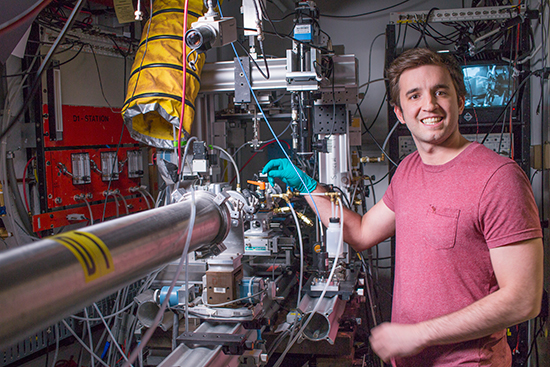X-RAY RUNS: Apply for Beamtime
2017 Nov 1 - Dec 21
2018 Feb 7 - Apr 3
2018 Proposal/BTR deadline: 12/1/17
2018 Apr 11 - Jun 4
2018 Proposal/BTR deadline: 2/1/18
The MaMaSELF program, short for Masters in Material Science Exploring Large-scale Facilities, is a two-year European Masters program in materials science, built off the framework of the Erasmus Mundus program that aims to teach the application of large scale facilities for the characterization and development of materials. Their objective is to train students to excel using a multidisciplinary and international approach, where students have the opportunity to choose from large-scale facilities across the globe to develop their research.
CHESS has partnered with MaMaSELF and the Technical University of Munich (Germany) to create a joint program: candidates receive general training at MaMaSELF headquarters in Rennes (France), then specific training in the field of polymer science in Munich, and then finally they have the opportunity to put their newly acquired knowledge to practice by doing state-of-the-art experiments at CHESS.
The opportunity to work in a large-scale facility such as CHESS is not one to be taken lightly. CHESS is an invaluable resource that most people will never have the opportunity to fully appreciate, only about half of the beamtime requests at the facility can actually be granted. Those who are granted the opportunity typically work for years on their research while simply studying the theory behind a lightsource’s usefulness before being granted beamtime.
CHESS works to overcome this by employing something that is ingrained in the culture of the lab: training the next generation of synchrotron scientists. Learning from lectures and theory of synchrotron science can only go so far, it is the hands-on experience of working in a large-scale facility that help shape a career that will excel. This is where CHESS can make a huge impact.
Both the culture and the magnetism it creates has allowed CHESS to welcome its first MaMaSELF student last month: Victor Oliveros Colón. Victor came to CHESS to study thin-film hydrogels on the D1 beamline with Staff Scientist Detlef Smilgies. Prior to coming to CHESS, Victor had studied materials science in his native homeland Spain, and then he joined the MaMaSELF program, with training at Rennes (France) and Munich (Germany), where he started to work on a specific project in the group of Prof. Christine M. Papadakis.
 Victor Oliveros Colón, MaMaSELF student studying thin-film hydrogels on the D1 beamline with Staff Scientist Detlef Smilgies.
Victor Oliveros Colón, MaMaSELF student studying thin-film hydrogels on the D1 beamline with Staff Scientist Detlef Smilgies.
“There is always a big jump between theory and practical work. I think that is the best part of coming here,” says Victor. “There is so much that you theoretically know, but when you come here, everything can be such different, but that is the best part. Even though there are synchrotrons in all parts of the world it is always good to know and understand how people work on the other side. I think that this is a great experience to choose, coming to the U.S.”
Victor’s research investigates multi-responsive polymers, and how they react to changes in pH level and temperature. The hydrogels respond to stimuli such as pH, temperature, and sound. During their response, the hydrogels have the capability to swell and change their structure, proving useful in diagnostics and biosensors. This is where CHESS comes in: the response of the polymer can be studied in real time and in-situ using small-angle scattering techniques which are offered at beamline D1.
Through MaMaSELF, Victor has been able to tour other large facilities in Europe, even getting the chance to participate in some research at SINQ, the Swiss Spallation Neutron Source. However, Victor did not realize the impact working at a large facility such as CHESS could have on his career until he was able to start his individual research.
“It is not that common to have your own beamtime to analyze a project, and being able to come to CHESS, and having Detlef here to guide me through the process is an invaluable experience that not that many people can have,” says Victor.
Now, Victor will focus on analyzing the data he has collected at CHESS. He will look for patterns to be able to put together a theory about the hydrogel’s response to pH and swelling in solutions. Further out, he seems ready for a wide variety of options.
“In 10 years, maybe I have my Ph.D. maybe, I am working in Industry. I don’t know,” he says. “Either way, I can tell them that I worked for 6 days working alongside a beamline scientist, I have gathered all of this information at a large-scale facility, and that is not comparable to anything else.”
In the immediate future, Victor seems quite happy being part of an international community that MaMaSELF has helped generate. He says, “right now, people from Taiwan, Ivory Coast, Argentina, they are your friends. It feels like a smaller world, and the science world is much much smaller. It is really cool.”
Submitted by: Rick Ryan & Detlef Smilgies, CHESS, Cornell University
06/12/2017
